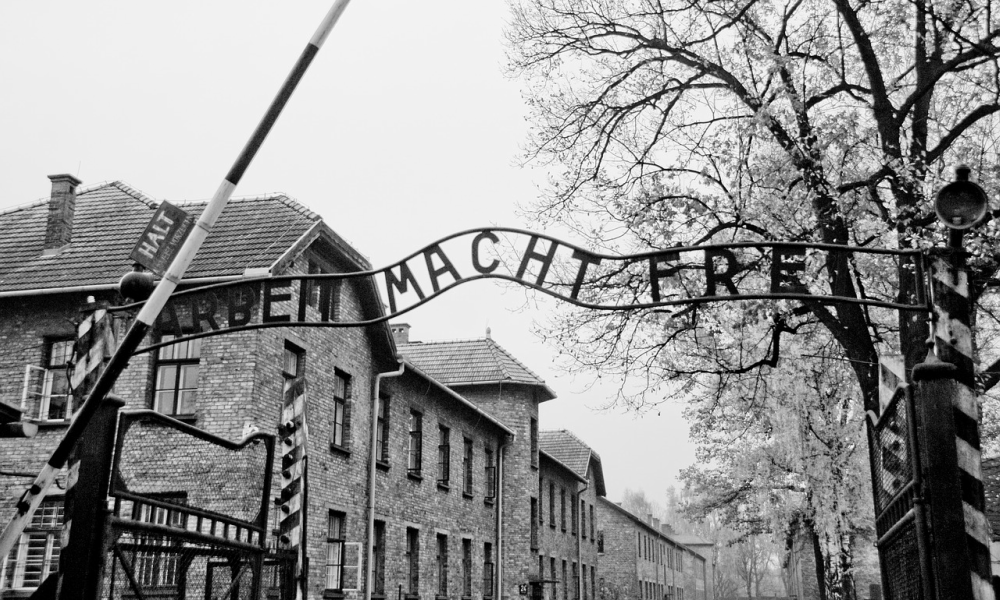Less than half of Americans can answer basic questions about the Holocaust, according to a new Pew Research Center report.
The report, released just before the 75th anniversary of the liberation of Auschwitz, examines the results of a survey testing Americans’ religious knowledge, which included five basic questions about the Holocaust. The results revealed that most Americans associate the Holocaust with the attempted annihilation of Jewish people: They know approximately when the Holocaust happened and what Nazi-created ghettos were, but less than half know how many people were killed during the Holocaust or how Hitler came to power.
Four of the questions were also included in a separate Pew survey of U.S. teens ages 13 to 17. Like adults, teens know more about the general timeline of the Holocaust than the specific death toll. Becka Alper, primary researcher on the survey, says that while the numbers aren’t totally lined up, it’s a similar pattern overall.”
According to Holocaust experts, these results are not surprising. “There’s very limited time in American classrooms to go in-depth into many historical issues, and the Holocaust particularly suffers from a very kind of superficial treatment,” says Christopher Mauriello, director of the Center for Holocaust and Genocide Studies at Salem State University. Usually, the Holocaust is “just a day or part of a day in a World War II course.” Mauriello says he enjoys teaching his students about the Holocaust because of the event’s complexity and multiplicity of causes, and he worries people look for straightforward answers to navigate our ‘“increasingly complex” world. “It’s troubling when people are looking for simple answers that go from A to B to C when history rarely goes that way.”
Respondents who had visited a Holocaust memorial or museum got about one more question right than those who didn’t. Mauriello says museums should have an even greater impact on Americans’ knowledge of the Holocaust, but that student visits to museums or memorials on school field trips are often rushed and ineffective. “They go through so quickly that they’re not given time to digest what they see and to talk with their teachers about it,” he says.
Mauriello hopes the current rise of anti-Semitism across the country will spark colleges and universities to teach students about the Holocaust in more detail. Conversations about the Holocaust and anti-Semitism can be difficult, but they are necessary to create change, he adds. “I don’t think you get anywhere by being silent and quiet and polite and sidestepping controversial issues.”
In both this survey and a similar 2010 Pew survey testing Americans’ religious knowledge, Jews, atheists and agnostics answered the most questions correctly. Steven Katz, director of the Elie Wiesel Center for Judaic Studies at Boston University, says this might be because people practicing these religions are often criticized and questioned. “They are, ironically, under attack all the time by the religious community, by the fact that they’re outsiders, by the fact that they’re a minority,” Katz says. “So they may educate themselves better in order to respond to people always criticizing and attacking and raising questions and putting them on the spot.”
Katz says the Holocaust is “baked” into American culture and that it’s “very difficult to grow up to be an adult and not at least know the word Holocaust,” but he thinks that Americans lack knowledge about specific details of the Holocaust because it is often spoken about in broad terms. “Movies, when they talk about it, don’t talk about the dates involved, the number of victims involved, the actual political circumstances involved. They always talk about in a very general vague way, like everything else that we talk about in America.”
Rebecca Carter-Chand, acting director of the Program on Ethics, Religion, and the Holocaust at the U.S. Holocaust Memorial Museum, served as a consultant on the survey. She says the survey’s results reflect a general decline in the teaching of humanities and that while there is now an emphasis on STEM education, history and humanities courses are essential. “Understanding the complexity of the events of the past can inform our ability to think critically about our choices today,” Carter-Chand says.
Learning about the Holocaust teaches us lessons about the fragility of societies, our capacity for evil and the dangers of unchecked hate and anti-Semitism, she adds. “We owe it to the victims to remember. And we owe it to ourselves to learn from this history.”

